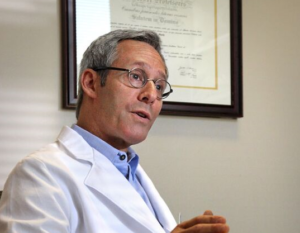HHS Proposed Rule Costs Thousands of Americans Their Lives over the Past Three Years
New Short Film Launched Today Spotlights
Need for Compensating Bone Marrow Donors
Arlington, Virginia—Many movies have the potential to change hearts and minds. But an award-winning short film making its public premiere today has the potential to change public policy and save as many as 3,000 American lives each year—and more across the globe. Everything—a 16-minute short narrative movie—examines the desperate moral choices a mother must make when her daughter’s bone marrow donor backs out.
The Institute for Justice created this movie to spotlight an abuse of power by the U.S. Department of Health & Human Services that is blocking cancer patients from finding life-saving bone marrow donor matches.
Everything, an award-winning 16-minute short narrative movie examining the issues of compensating bone marrow donors, was released today with a Wall Street Journal op-ed and is available at www.Everything.movie. The film has already racked up 14 laurels from film festivals across the nation and recently won Best Narrative Film and Best Narrative Short at the Anthem Film Festival in Las Vegas. Among its stars are Michel Gill, who played the President of the United States in the first two seasons of House of Cards, and Mandy Levin, who delivers a heart-wrenching portrayal of a mother desperately trying to find another compatible donor for her daughter after the only donor known to be compatible refuses to donate.
The inspiration for the film is a 2009 constitutional lawsuit brought by the Institute for Justice against then U.S. Attorney General Eric Holder on behalf of cancer patients from across the nation. The suit successfully challenged the National Organ Transplant Act (NOTA) of 1984, which barred compensating bone marrow donors. Anyone who facilitated compensation—doctors, nurses, donors and patients—faced up to five years in prison.
In a ruling that became final in the summer of 2012, the 9th U.S. Circuit Court of Appeals ruled that the ban on donor compensation could not be applied to most marrow donations.
But no sooner was that precedent established than the U.S. Department of Health & Human Services proposed a new rule that would negate the legal victory and block model research programs designed to examine the effectiveness of compensation. HHS sought to unilaterally declare—without Congressional approval—that marrow cells freely circulating in the blood stream are an “organ,” even though, as the 9th Circuit court ruled, cells in the bloodstream are not an “organ” under any scientific definition of the word. Nearly 500 people—including Nobel Laureates Alvin Roth and Daniel McFadden—wrote to HHS discouraging it from adopting the rule. But for nearly three years now, HHS has remained silent, blocking such research and costing American cancer patients their lives. As a result of the pending rule, the model research programs were forced to shut down until a more certain future for the study could be assured.
“HHS has done nothing for 32 months now, just sitting on its proposed rule, and in that time, thousands of Americans have died because they couldn’t find a matching marrow donor,” said Institute for Justice Senior Attorney Jeff Rowes, who successfully litigated the case in federal court clearing the way for compensating most bone marrow donors. “Doing nothing is unconscionable and HHS should make a decision.”
“The right decision here is simple: Allow advocates for donor compensation to see if their approach works to save lives,” said IJ Senior Attorney Bob McNamara, co-counsel on the case. “Bone marrow donation is proven medical science, and thousands of altruistic donors are trusted every year to make an informed decision to donate. There is no rational reason to believe that donors lose their capacity to consent to donation just because they are compensated. Bone marrow is completely renewable; just like with blood donation, marrow donors don’t lose anything permanently. But donating marrow does take time, and it makes sense to give people some modest compensation for giving up their time to save a life. No one denies that there is a real shortage of matching marrow donors, and there are researchers and entrepreneurs who are ready to figure out whether compensating donors can help eliminate that shortage. The only thing standing in their way is HHS.”
“HHS’s proposed rule is illegal and unconstitutional because it is based on a falsehood,” said Rowes. “HHS seeks to define cells taken from your bloodstream as ‘organs,’ which they aren’t. This is why no one has ever thought NOTA prohibits paying people for other blood components such as platelets. The law does not allow government agencies to redefine words in order to grant themselves more power.”
“I don’t think that anybody should go to jail just for trying to save somebody’s life,” added Doreen Flynn, who has three children with Fanconi anemia, a blood disease that frequently requires a bone marrow transplant, and who was the lead plaintiff in the original lawsuit. “If paying donors results in more marrow donations, we should pay them. And it shouldn’t be a crime to investigate it.”
Flynn’s story inspired the movie Everything.
“We know what doesn’t work,” Rowes concluded. “We have 30 years of experience with an altruism-only marrow-donor program, and we know that has not succeeded in recruiting enough donors. The only question is whether offering compensation can achieve better results. We will not allow the federal government to make it a felony to find out the answer. Hopefully, we will do that by persuading the government not to adopt this rule, but if we have to, we will sue them again. And we will win—again.”













